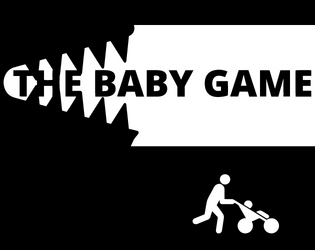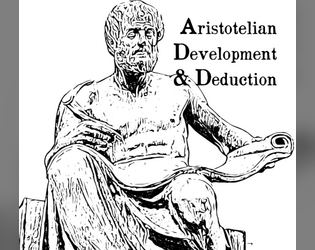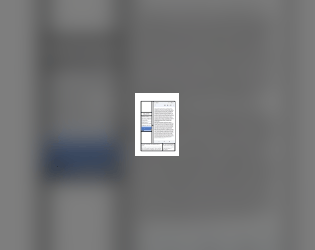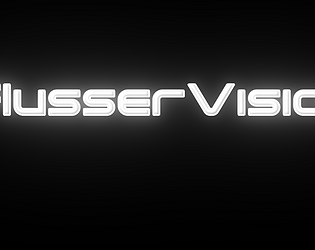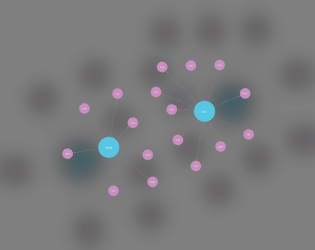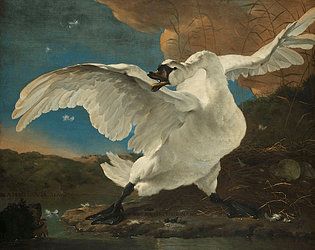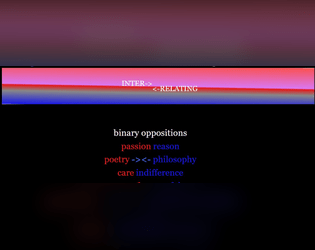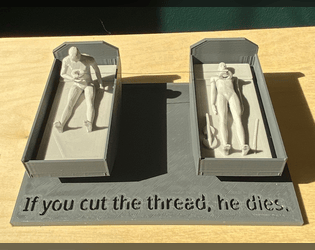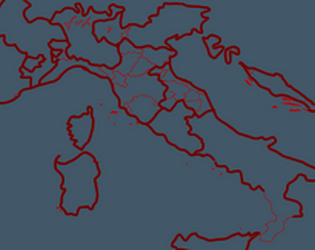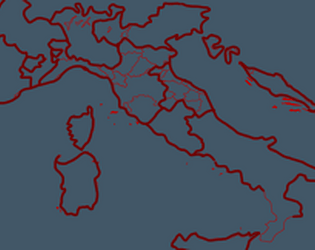This jam is now over. It ran from 2022-02-28 23:00:00 to 2022-11-01 11:59:59. View results
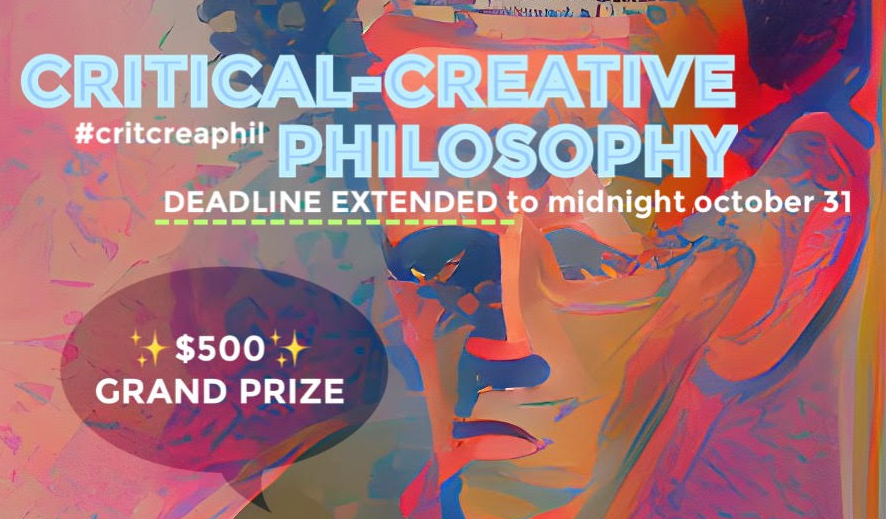
Critical-Creative Philosophy is a half-year jam running from the beginning of March 2022 until the end of September 2022 the end of October 2022. Participants are asked to create a “critical-creative” piece based on a canonical work of philosophy. This means that their (and their audience’s) critical engagement with the work of philosophy they’ve chosen should take a creative form. For some examples of what we have in mind when we say this, please see our FAQ.
Artistic pieces inspired by the lives and works of famous philosophers are ubiquitous, but few of these make substantive, lasting contributions to the ways their philosophies are understood by academics or by the general public. Academic scholarship is difficult for the general public to access, too, and does not do as much as it could to enrich their approaches to the canons, traditions, and problems they’d like to learn more about or explore for themselves.
Our jam aims to bridge this gap between academic philosophy and philosophy as an activity that anyone might enjoy. We want you — yes, you, regardless of your philosophical background and experience — to create pieces that combine the critical and the creative, such that anyone with an interest in the philosophical work you’ve chosen will learn something about it, see it with fresh eyes, or simply enjoy (re)visiting it in a new form.
To encourage participation from a wide variety of people, we offer the following prizes:
- 🔹 Panel winner: PM-CYOA by LogicalAtomist -- $500 in compensation and publication in the digital review. This prize is awarded by our panel of judges.
- 🔹 Runner-up: Sweet Justice by alexandeer -- publication in the digital review. This prize is also awarded by our panel of judges.
- 🔹 Popular winner: Aristotelian Development & Deduction by ClutchFumble -- publication in the digital review. This prize is chosen through itch.io’s jam voting system by jam participants. It goes to the highest ranked piece that has not been selected as the panel winner or as a runner-up.
- 🔹 Winners will be published in issue 03 of the digital review, "counter-works," to be released late 2023.
Our judges are:
- 🔹 Ian Hatcher – performance artist, freelance programmer, poet, and musician
- 🔹 Elyse Lemoine – writer and games developer specializing in narrative design at Riot Games
- 🔹 Carlota Salvador Megias – PhD candidate in philosophy at the University of Bergen and jam host
- 🔹 David Stern – professor of philosophy at the University of Iowa and creator of the University of Iowa Tractatus map
- 🔹 El Toon – writer and TTRPG creator
Banner and header art generated with the DREAM by Wombo app, then edited in Logo Maker. Background photograph taken by Carlota Salvador Megias, then edited in Darkroom and NOMO CAM.

1. What do you mean by “critical-creative?”
Critical-creative work collapses what are typically considered two distinct activities: 1) Critical engagement with (in this case) a work of philosophy, where the object is to follow/reject/qualify its argument or to capture its spirit; and 2) the creation of an artistic work — something that solicits the imagination; plays with its medium; implicates artist or audience in the manner it unfurls.
We are interested in pieces where critical engagement with a work of philosophy takes a creative form, and where this interplay between philosophy and artistic creation is mutually illuminating. For examples, please see FAQ #3 and #4.
2. How should my critical-creative piece relate to philosophy?
Your primary source — a work of philosophy — should not just inspire your piece. It should not serve as a font for quotations, concepts, characters, axioms, etc., that you simply adapt to your piece’s subject matter (ex., “If one were to press me to say why I loved him, I feel that this cannot be expressed. [… It is because he] was he; [and I] was I.” — Montaigne, quoted in a piece about friendship). Nor should it merely occasion your piece by featuring its buzzwords (ex., Wittgenstein’s language-games) or what are commonly thought to be its takeaways (ex., Nietzsche’s ubermensch makes their own law).
Rather, your piece should be in the service of the work(s) of philosophy you’ve chosen. It could enrich, challenge, or clarify your audience’s reception of the work(s). It could prompt your audience to enact the work’s argument; tinker with its system of description; connect with one of its characters; or fiddle with the raw text of the work itself. It could juxtapose one work with another such that your audience’s understanding of both is changed in a way that only this juxtaposition could make possible. It could upset some aspect of your work’s foundations, overhaul its structure, or bring it to bear on something that was unimaginable at the time of its creation. You could take some things and leave others. We welcome anything, so long as it is both a piece of scholarship and a work of art (broadly construed).
3. What kinds of pieces can I submit?
We will accept games of any stripe (board games, solo and collaborative tabletop roleplaying games, video games, etc.); visual, aural, or literary art; and works within the digital humanities (except straightforward archives such as The Nietzsche Source and The Wittgenstein Source). The piece must feature an interactive component and may be excerpted from a larger work. We especially welcome pieces that are born-digital and are not opposed to submissions that are drafts or outright vaporware. Here are some examples:
- 🔹 Socrates in the Labyrinth by David Kolb — explores what hyperlinked, non-linear philosophical argumentation might look like in a malleable interface, with sources ranging from Plato’s Socrates to Hegel
- 🔹 The University of Iowa’s Tractaus map — visualizes Wittgenstein’s Tractatus Logico-Philosophicus as a subway system
- 🔹 let’s play shadowgraphs by Cr. Sal----- -----s — a playable reimagining of the “Shadowgraphs” fragment from Kierkegaard’s Either/Or
Please note that your piece must be (and remain) free for all to access. We accept submissions in any language. If you’re looking for inspiration, we'll highlight examples of critical-creative pieces from other disciplines and pitch ideas for individual pieces on our Twitter feed. You are welcome to develop these ideas into your own projects – just link back to the original Tweet.
4. I still don’t really get it. Can you give me more examples of critical-creative work?
Here are some examples (of, I should note, works that we consider critical-creative but would not accept as submissions — compare FAQ question #3, above):
- 🔹 The Chinese Notebook by Ron Silliman — a book of poetry dealing with the form and subject matter of Wittgenstein’s Philosophical Investigations (would not be accepted because it does not have an interactive component)
- 🔹 The Library of Babel by Jonathan Basile — a website that brings Jorge Luis Borges’ short story “The Library of Babel” to life (would not be accepted because its primary source is a work of literature by a fiction author)
- 🔹 Zong! by M. NourbeSe Philip — a book of poetry that wrenches the voices of the black men and women aboard the slave ship Zong from the legal decision that is the only testament to their massacre (would not be accepted because its primary source is the text of Gregson v. Gilbert, a legal document)
- 🔹 The Strangerer by Mickle Maher — a play that splices together Camus’ The Stranger and the 2000 United States presidential election (would not be accepted because it does not have an interactive component)
- 🔹 FICT.site — a group of academics who create and investigate artifacts from speculative timelines as a means of understanding the effects of European colonialism (would not be accepted because it is an academic practice; having said that, individual artifacts produced within this framework would be accepted were they to take a work of philosophy as their point of departure)
If you’re unsure whether your project would qualify for this competition, please feel free to shoot us an email at critcreaphil [at] gmail [dot] com prior to the submission deadline. We’re happy to clear your project or to point you in the right direction.
5. Who can submit a piece to this jam?
Anyone. We particularly encourage submissions from persons without permanent academic positions, such as graduate students, postgraduates, and independent researchers, regardless of their field. You do not need an institutional affiliation to submit a piece to this jam, nor do you need to be involved in academia.
6. What should I include with my submission?
Submissions should include your piece, a short description that reflects upon what it’s doing, and a link to a document that lists any relevant references and sources. We also ask that you tell us a bit about who you are. Please see our Rules for additional information about citations.
7. What works of philosophy are eligible as my primary sources for this jam?
Any work by any canonical philosopher from any philosophical tradition is eligible, provided the philosopher in question is no longer alive. Please feel free to shoot us an email if you’re worried about the eligibility of the work(s) you’ve chosen at critcreaphil [at] gmail [dot] com.
We emphasize that your piece should not be about the life of a particular philosopher (ex., we would not accept a piece like 88 Constellations for Wittgenstein (to be played with the Left Hand) by David Clark — according to Clark, this piece is a metabiography).
8. What if I want to make a piece that deals with a particular philosophical problem, as opposed to a philosophical work?
You’re welcome to do so provided the piece is grounded in at least one work that fits the specifications set out in FAQ #7, above.
9. My piece deals with a work of philosophy that is also a work of art (ex., a novel by Simone de Beauvoir). Can I submit it to this competition?
Yes — but we urge you to clear it with us in advance, particularly if it is in the “philosophical novel” genre; is not written by a philosopher; or is predominantly discussed in literature departments (ex., Milan Kundera’s The Unbearable Lightness of Being, which falls under all three categories).
10. I’ve never done this in my life and have no idea where to start.
Check out the examples mentioned throughout this FAQ, poke around our Resources, and scroll through our Twitter feed to see what catches your eye and if there’s someone in the likes/comments/retweets you might like to connect with. We also encourage you to chat with other participants in the Community tab forum on our itch.io page.
11. I have more questions!
Please email us at critcreaphil [at] gmail [dot] com or post your question to the extended FAQ topic in the Community tab on the jam’s itch.io site.

- 🔹 1. Submissions may be created by one person or by multiple people. To recapitulate the FAQ, anyone is welcome to participate. Please create an itch.io account to submit your work, should you not already have one. !! Change on June 3rd, 2022 !! We will not accept more than one submission per person or team.
- 🔹 2. Submissions may be as interdisciplinary as you like, provided that their primary source text is a work of philosophy within the limitations set in our FAQ. We emphasize that we will not accept pieces about the lives of philosophers, living or dead, or that concern themselves with the works of living philosophers.
- 🔹 3. Submissions need not be new, previously unpublished, nor expressly created for this jam. !! Change on April 15th, 2022 !! Pieces chosen for publication must be removed from itch.io a few months before the digital review issue that features them goes live. If you have published (a version of) your piece elsewhere, please contact the jam host at critcreaphil [at] gmail [dot] com to determine its eligibility for the competition.
- 🔹 4. !! Change on October 31st, 2022 !! You may upload your submission at any point during the jam, but please be aware that you will be prevented from editing it during the voting and judging period: November 7th, 2022 — December 12th, 2022. Submissions will not be visible to the public until the deadline has passed on November 1st, 2022.
- 🔹 5. Voting for the popular winner category will take place on itch.io exclusively among participants to the jam. !! Change on October 31st, 2022 !! Please see this post for more information.
- 🔹 6. Please do not plagiarize. As an extension of this, please be generous when you cite your sources. Here is an example references document which you can use to make your own. You must cite a source for everything you reference or use that you have not created, regardless of where you’ve found it. This includes social media posts, obscure books, personal correspondence, etc. Citations need not meet the standards of academic formatting: A simple hyperlink will do. We encourage you to acknowledge those whom have helped you learn a new skill, pointed you in the direction of a good resource, or sparked a fresh insight.
- 🔹 7. Please be kind and respectful to your fellow participants.
- 🔹 8. The panel reserves the right to decline submissions at their discretion.
- 🔹 Should you have any doubts about the eligibility of your work, please don’t hesitate to reach out to us at critcreaphil [at] gmail [dot] com.

🔹 Last updated: February 21st, 2022 🔹
… Here for sample projects or to get some ideas? Check out the jam description and FAQ or scroll through this.
“I want philosophical resources – primary sources; commentary; things to watch/listen to/read…”
- 🔹 Wikipedia’s list of important publications in philosophy — if you’re totally new to this and need somewhere to start!
- 🔹 The Stanford Encyclopedia of Philosophy (SEP) — contains academic, introductory articles to key philosophers, problems, traditions, and areas of scholarship written by experts, each of which is capped off by a lengthy bibliography (we recommend you use their search function or check out what’s new; see also the Internet Encyclopedia of Philosophy)
- 🔹 Project Gutenberg’s philosophy bookshelf — contains free copies of many classics (we urge you to compare the freely accessible and published translations of works you cannot read in their original language; see also The Open Library, which requires you to register an account, and the Internet Archive, which contains just about everything that’s currently in the public domain)
- 🔹 The Daily Idea’s list of syllabi — a collection of syllabi from a variety of universities, useful if you’d like some commentary or additional resources on a particular philosopher or subject beyond what you might find on the SEP (we also recommend a Google search of the subject/philosopher/work + syllabus)
- 🔹 We also urge you to search for video lectures, podcasts, and popular articles by experts in your chosen philosopher/work/subject of interest, and to talk to your friends with philosophical experience and interests
“I want to know more about critical-creative scholarship in its own right — give me theory!”
- 🔹 David Kolb has a variety of papers available on the intersections between philosophy and born-digital writing on his website — see in particular the essays “Scholarly Hypertext: Self-Represented Complexity” and “Association and Argument: Hypertext in and Around the Writing Process”
- 🔹 Alex Saum-Pascual’s “Creative Making as Critical Thinking: A New Framework for the Digital Humanities” and her introduction to the ebr gathering “Electronic Literature [Frame]works for the Creative Digital Humanities” with Scott Rettberg
- 🔹 Lyle Skains’ “Creative Practice as Research: Discourse on Methodology” — particularly useful for its breakdown of how practice and research come together in critical-creative work
- 🔹 David Stern’s paper on the University of Iowa’s Tractatus Map at the Nordic Wittgenstein Review (note: the website seems to be having some trouble with its security certificate)
“I want tools and inspiration for making born-digital works.”
- 🔹 Twine — an open-source program for non-linear, interactive works that does not require (but can readily incorporate!) knowledge of code; see also Ink and its simpler tool, Inklewriter — another set of open-source programs for interactive works
- 🔹 If you’re more confident in your coding chops and want to make something that looks more like a game rather than a piece of interactive fiction, check out GDevelop
- 🔹 You’ll find a variety of simple digital tools and examples of how they’ve been used by students in Melinda White’s paper “Plat(free)forms: accessible tools for new e-lit composers”
- 🔹 itch.io’s game assets listings — a variety of free and paid resources are available: fonts, sprites, music, sounds, game layouts… we also recommend looking through other ongoing jams’ resource lists for more (especially their write-ups on how to get started with particular projects)
- 🔹 If these options overwhelm you, it’s easy to make an interactive piece with something like Google Forms — check out Wired’s write-up of Porpentine’s piece and Sylvia Duckworth’s guide to making these on Forms and other Google services
“I want tools and inspiration for making print and/or digital TTRPG’s.”
- 🔹 One of the best ways of making your own TTRPG’s is by modding existing systems (with permission, of course) — see, for example, Wretched & Alone (for solo games/players; check out A Mother’s Love for the system in action) and Beyond Reach (for two players; check out Finding Aid for a hack)
- 🔹 One-page games are some of the simplest and most versatile you can make – check out This Place is a Zoo (winner of the 2021 One Page Dungeon Contest) and the extensive collection by Rowan, Rook and Decard
- 🔹 You’re probably familiar with the Dungeons & Dragons system, but here are some of our other favorites for you to explore, take inspiration from, and create stories for: Kids on Bikes (there are free samples if you scroll further down the page), the Fate System Reference Document (SRD), and Powered by the Apocalypse
“I want tools for stuff that might supplement my work – how to cite; how to copyright; how to introduce it/myself to an audience…”
- 🔹 Here’s a breakdown of Creative Commons licenses, which we recommend you use (but by no means require) for your project. Note that some uses of copyrighted material are permitted under the United States' Fair Use laws and similar throughout the rest of the world
- 🔹 If you’re curious about how to format citations and have never (or rarely) done so before, we recommend the Purdue Online Writing Lab MLA Formatting and Style Guide’s sections on Works Cited — we emphasize that you do not need to format your own references so extensively for your project (see Rule #6), but we certainly don’t mind if you do
- 🔹 Want to give your work a good introduction? Check out the examples throughout our Twitter/blog and watch this space for how you might format your own closer to submission time
Submissions(11)
No submissions match your filter


